Table of Contents
Support truly
independent journalism
Our mission is to deliver unbiased, fact-based reporting that holds power to account and exposes the truth.
Whether $5 or $50, every contribution counts.
Support us to deliver journalism without an agenda.

Donald Trump is well-known for many traits: his divisiveness, his career in real estate, The Apprentice, his lawsuits, for being the only president to be impeached twice and now his felony conviction. But perhaps nothing has infiltrated society more than Trump’s unique linguistic style.
Whether he’s posting on Truth Social, speaking at a campaign rally or testifying in court, Trump never seems to be at a loss for words — and sometimes, he even makes up new ones.
From uttering gaffes to tweeting typos (like “covfefe”) to misreading words (like “Nambia”) to dismissing his opponent with a harsh nickname, his terminology quickly turns iconic.
Here, The Independent offers a dictionary guide to Trump’s most memorable phrases:
Barack Obama
Barack Obama was the 44th president of the United States.
However, in Trump lingo, his name could also be a stand-in for Joe Biden, the current US president and Obama’s former vice president. During an Oct. 1 rally in Iowa, Trump referred to Obama instead of Biden; he also confused the two names twice in an Oct. 11 radio interview. Forbes calculated he has made that mistake seven times in recent months.
Although he has claimed that the mixups were intentional, critics say the gaffes could be a sign of aging or diminishing cognitive ability.
Used in a sentence: “What would you advise President Obama? The whole world seems to be exploding.”
Bigly
The word first appeared in Trump dialect during the 2016 presidential debates. The term sparked a post-debate debate; some argued that Trump was saying “big league,” but others argued that a close listen renders “bigly.”
The term is defined in the Merriam-Webster dictionary as an adverb form of “big.”
The 2024-GOP frontrunner resurrected the term in February while bashing his Republican rival Nikki Haley’s performance in the primary elections.
Used in a sentence: “She’s losing it bigly.”
Birdbrain
The term means a stupid person. Trump has used it to refer to Haley, whom he tapped to serve in his Cabinet as ambassador to the United Nations.
Used in a sentence: “MAGA, or I, will never go for Birdbrain Nikki Haley.”
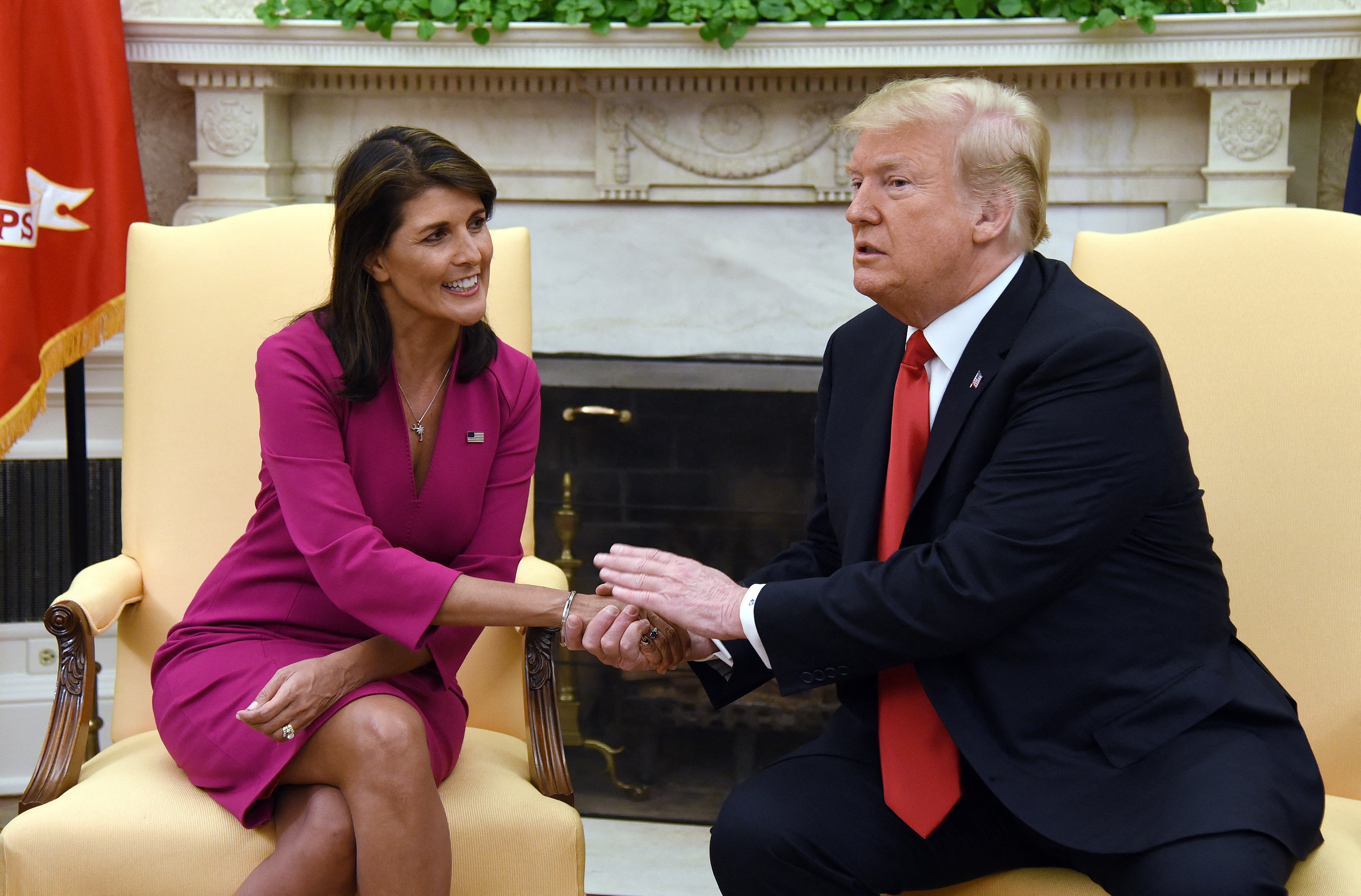
Corrupt
Trump relies on this term as a sort of catch-all to describe his disappointment du jour. He has described the Manhattan District Attorney Alvin Bragg, hush money trial Judge Juan Merchan, Biden, the government and the lawsuits against him as “corrupt.” He even pulls out the term on vacations.
Used in a sentence: “HAPPY EASTER TO ALL, INCLUDING CROOKED AND CORRUPT PROSECUTORS AND JUDGES THAT ARE DOING EVERYTHING POSSIBLE TO INTERFERE WITH THE PRESIDENTIAL ELECTION OF 2024.”
Covfefe
Covfefe was born just after midnight on May 31, 2017, in a tweet by Trump. Then-press secretary Sean Spicer insisted at the time that “the president and a small group of people know exactly what he meant” – but never elaborated.
Used in a sentence: “Despite the constant negative press covfefe.”
Crooked
An epithet given to a few of Trump’s perceived rivals, including — but not limited to — Hillary Clinton, Biden and fraud trial Judge Arthur Engoron.
Used in a sentence: “Crooked Joe Biden is so bad — he’s the worst president in the history of our country.”
Department of Injustice
This is a term used to reflect the former president’s discontent with the Department of Justice. A special counsel for the DOJ, Jack Smith, filed two criminal cases against Trump – one related to his alleged mishandling of classified documents and the other related to reported 2020 election interference.
Used in a sentence: “The ridiculous and baseless indictment of me by the Biden administration’s weaponized ‘department of injustice’ will go down as among the most horrific abuses of power in the history of our country.”
Desanctimonious
This term is used to describe his 2024 Republican rival, Florida Governor Ron DeSantis. It combines the last name DeSantis with “sanctimonious,” which means hypocritically pious or devout, according to Merriam-Webster.
The term derives from DeSantis acting “disloyal” by running against him for president after he helped get the Florida Republican elected as governor, the former president told Fox News. Tragically, Trump announced he was retiring the nickname after DeSantis dropped out of the 2024 race and threw his endorsement behind the former president.
Used in a sentence: “Ron DeSanctimonious has become an Absentee Governor of Florida, never there, not working.”
ELECTION INTERFERENCE
Perhaps unable to escape the pull of autocorrect after typing it out so many times, this term is almost exclusively used by Trump in all-caps. He has claimed that the Justice Department’s investigations into him and the subsequent indictments are examples of “ELECTION INTERFERENCE.”
Used in a sentence: “The whole World is watching as the USA turns into a Banana Republic. Biden should repudiate and stop this plan before it is too late. ELECTION INTERFERENCE!”
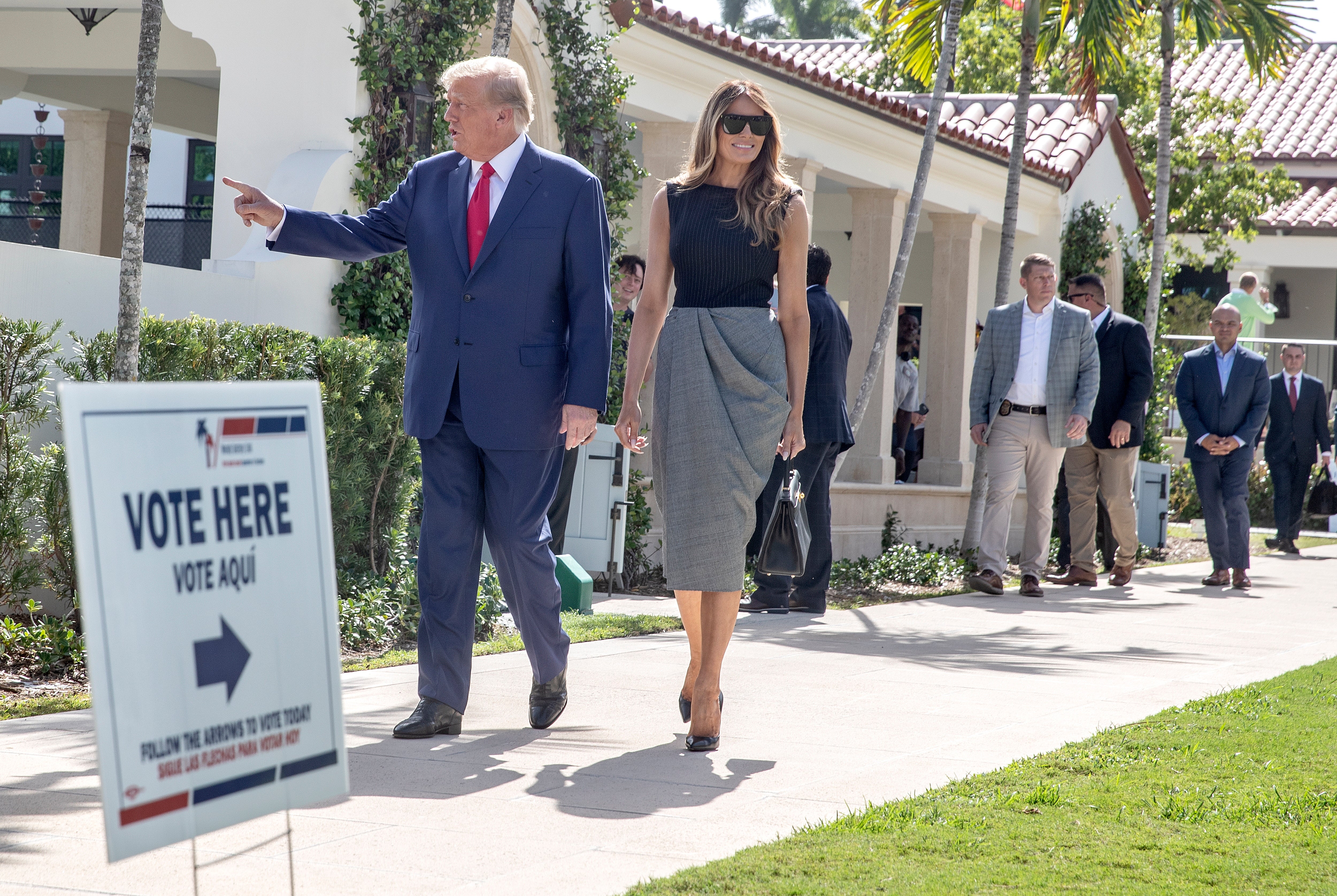
Fake News
Trump tends to dismiss unsavoury reports about him or media organizations that may produce such reports as “fake news.” He has used the phrase in the context of disparaging the lawsuits against him, the impact of Covid-19 and even a CNN reporter.
Used in a sentence: “You’re fake news,” Trump told CNN correspondent Jim Acosta.
Horseface
In a tweet, Trump used this term to describe Stormy Daniels, a porn star with whom he allegedly had an affair. Trump was found guilty of 34 felonies for making hush money payments to keep his relationship a secret from voters.
After he called Daniels this name, she replied, calling out his “shortcomings” and said: “Game on, Tiny.”
Used in a sentence: “Great, now I can go after Horseface and her 3rd rate lawyer in the Great State of Texas.”
MAGA
The abbreviation stands for “Make America Great Again,” Trump’s campaign slogan, which is often found emblazoned on red baseball caps. It can also be used as a descriptor for supporters of Trump.
Used in a sentence: “Join me in Durham, New Hampshire for a MAGA Rally on Saturday, December 16, 2023 at the Whittemore Center Arena!”
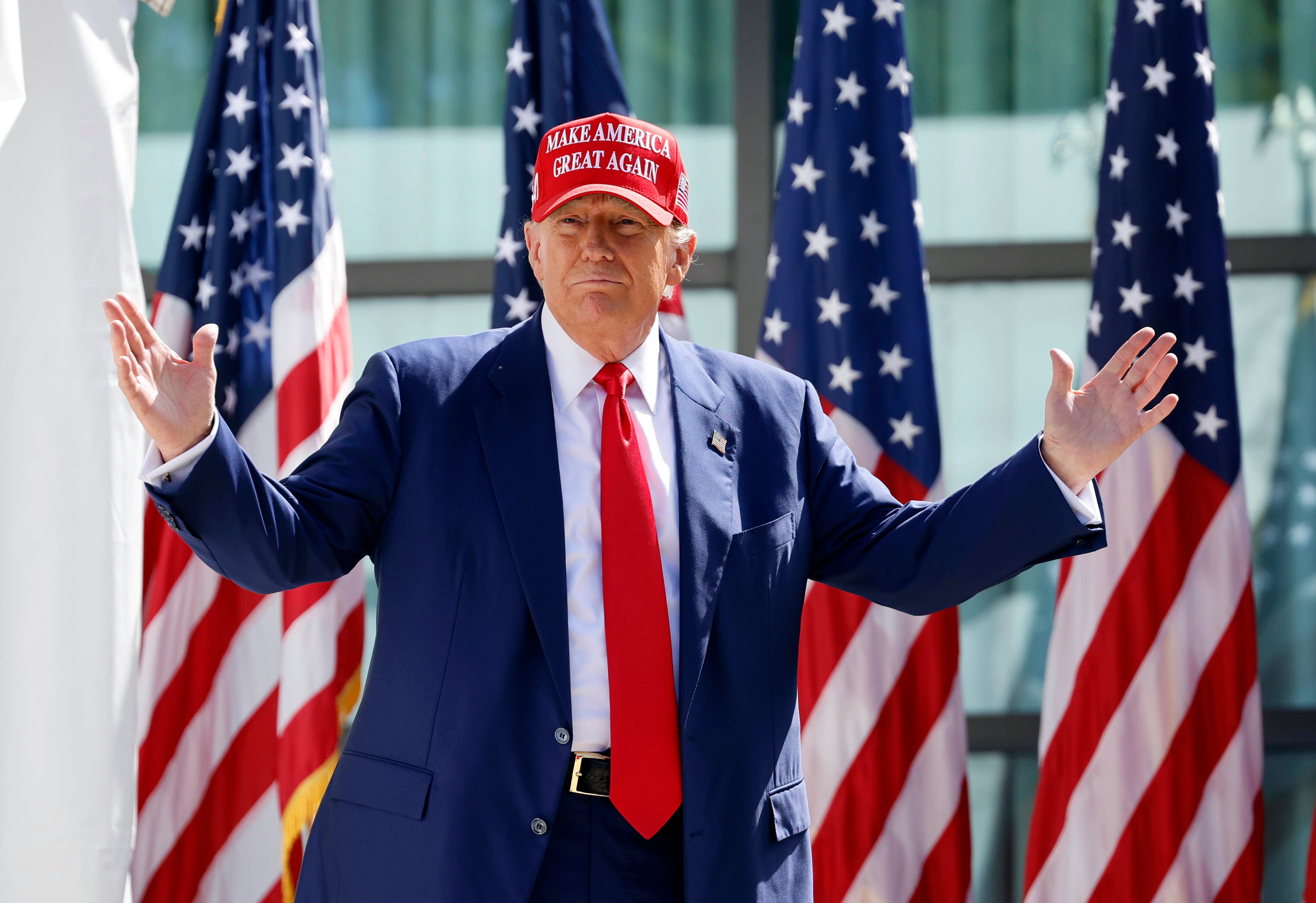
Laffin’ Kamala Harris
The vice president was finally given a Trump nickname as talks of Harris rising to the top of the 2024 Democratic ticket should Biden pull out of the presidential race began to circulate. In his characteristically creative use of spelling the English language, the former president used “laffin’” but probably meant “laughing.”
Harris often chuckles — and has even been criticized for having a “weird laugh” before.
Used in a sentence: “Respects to our potentially new Democrat Challenger, Laffin’ Kamala Harris.”
Lamestream Media
Trump utilizes this as a derogatory alternative term for “mainstream” media outlets that often don’t agree with him. He often finds these outlets guilty of so-called “fake news” (see: “fake news”).
Used in a sentence: “The Lamestream Media is doing everything within their power to foment hatred and anarchy. As long as everybody understands what they are doing, that they are FAKE NEWS and truly bad people with a sick agenda, we can easily work through them to GREATNESS!”
Mental midget
The term is used to describe someone who is not smart. In the language of Trump, it’s used to describe one actor in particular.
Used in a sentence: “Robert De Niro is a ‘mental midget’ whose mind is shot, and whose life is a total train wreck.”
Nambia
Then-president Trump mentioned the nonexistent country of “Nambia” — twice — when addressing African leaders in 2017. He seemed to be referring to the very real country of Namibia.
Used in a sentence: “Nambia’s health system is increasingly self-sufficient.”
Newscum
This catchy nickname combines the word “scum” with the last name of the California Gov. Gavin Newsom. The first known use of the term can be traced back to February 2024, when Trump visited the southern border and gave a speech mentioning the state.
Used in a sentence: “You look at what this Governor Newscum from California…Isn’t that his name? Newscum? What he’s done to California is unbelievable.”
Peekaboo
Trump uses this term to refer to New York Attorney General Letitia James; the reason behind such a bizarre nickname is unclear, but some have pointed to the term sounding like a racist word.
Trump’s former fixer, Michael Cohen, disagreed with that theory. He told Business Insider that he was chalking up the nickname to the former president’s “dementia.”
Used in a sentence: “We have totally proven our Case against the Corrupt, Racist, New York Attorney General, Letitia “Peekaboo” James.”
Perfect phone call
Trump used this phrase defensively to describe two infamous phone calls. First, he used this term when referring to his phone call with Volodymyr Zelensky — the contents of which eventually led to his first impeachment. He used the term again to describe the call he made to Georgia Secretary of State Brad Raffensperger in an effort to help him “find” more votes.
Used in a sentence: “I’m the only one to get impeached on a perfect phone call, like a perfect phone call.”
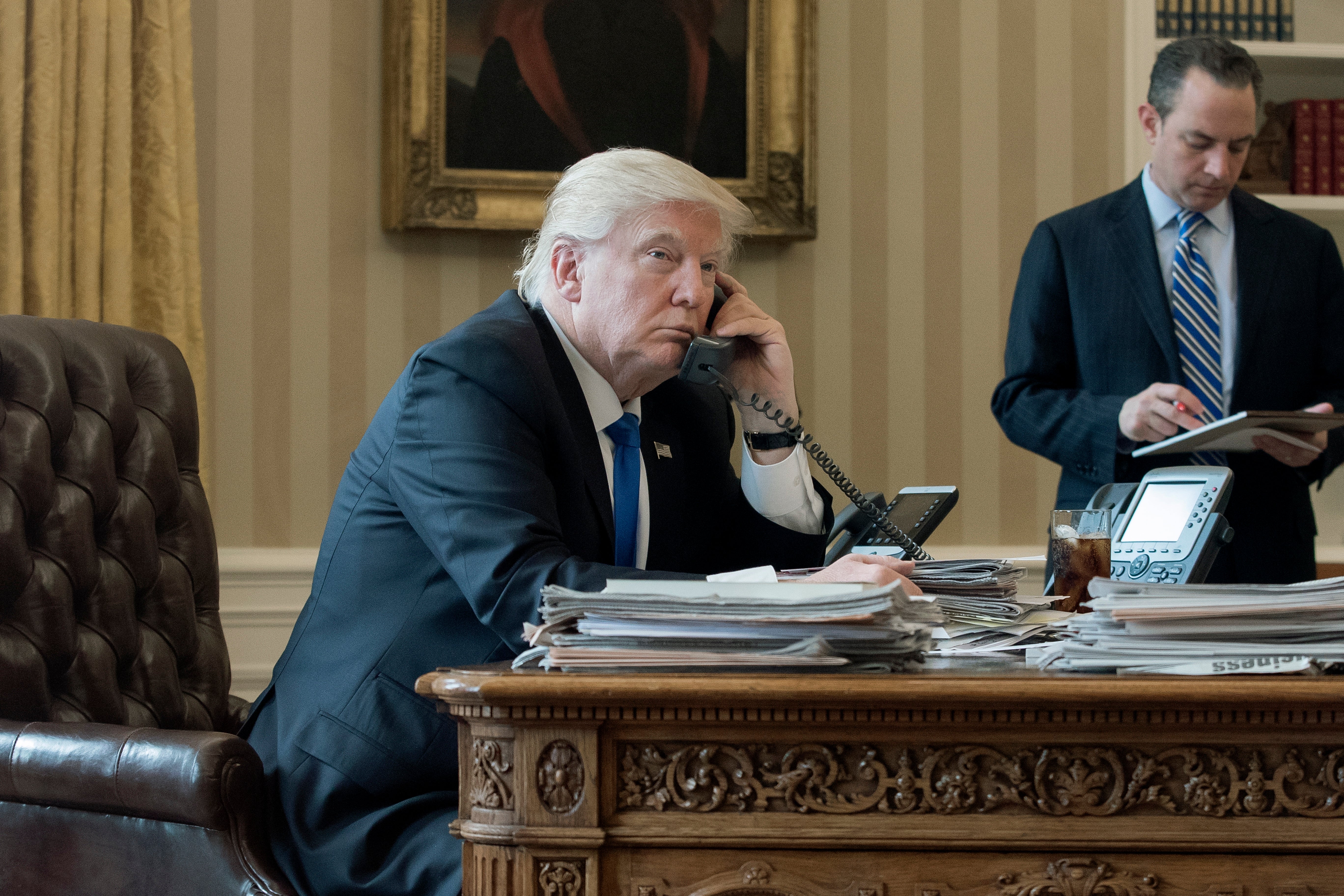
Person, woman, man, camera, TV
Trump’s supposed proof that he is a genius (see: “very stable genius”). The former president was asked to complete a cognitive evaluation. He later recalled the memory test in an interview and bragged about his ability to repeat the phrase: “person, woman, man, camera, TV.”
He underscored just how difficult the test typically was for others — but not for him: “If you get it in order you get extra points. [The doctor] said nobody gets it in order, it’s actually not that easy, but for me, it was easy.”
Used in a sentence: “It’s like you’ll go ‘person, woman, man, camera, TV’. So they’ll say, ‘Could you repeat that?’ So I said, ‘yeah’. So it’s: ‘person, woman, man, camera, TV.’ OK, that’s very good.”
Rigged
Perhaps one of the former president’s most repeated words, “rigged” in Trump dialect means something that is unfair to him — most notably the 2020 election.
Used in a sentence: “It was a rigged election, and it was a stolen, disgusting election.”
RINO
The abbreviation stands for “Republican In Name Only.” Trump often casts his GOP political rivals as “RINOs,” such Mitch McConnell.
Used in a sentence: “Happy Easter to all, including those that dream endlessly of destroying our country because they are incapable of dreaming about anything else…& to all of those weak & pathetic RINOs…!”
Sad!
A Donald Trump favorite. He likes to tack on the term sarcastically to the end of tweets, Truth Social posts, and the like, to call something “sad,” which he usually doesn’t feel bad for at all. The exclamation point is essential to emphasise the sadness.
Used in a sentence: “Whoopi Goldberg is terrible. Very sad!”
Sarcasm
Trump likes to rely on “sarcasm” as an excuse for a gaffe or to get out of the limelight after making a controversial statement. The Independent tabulated that the former president has cited the term at least seven times — including when he recently tried to explain why he interchanged Obama’s name for Biden (see: “Barack Obama”).
Used in a sentence: “Ratings challenged @CNN reports so seriously that I call President Obama (and Clinton) ‘the founder’ of ISIS, & MVP. THEY DON’T GET SARCASM?”
Sleepy Joe
Trump, who infamously fell asleep while he was sitting as a defendant in a Manhattan courtroom, often refers to his 2024 rival Biden as “Sleepy Joe.” Using the moniker, Trump has attempted to depict the image of a tired, old candidate. In reality, the president is just three years older than Trump.
Still, the former president has tried to play up his successor’s age, likening Biden to “a sleepy guy in the basement of a house” and insisting “the guy doesn’t even know he’s alive.”
Used in a sentence: “So tonight we’ll refer to him as Sleepy Joe because right now, as you know, it’s been reported that right now, Crooked Joe has gone to a log cabin to study. Prepare? No. He’s sleeping now because they want to get him good and strong. So a little before debate time, he gets a shot in the a**.”
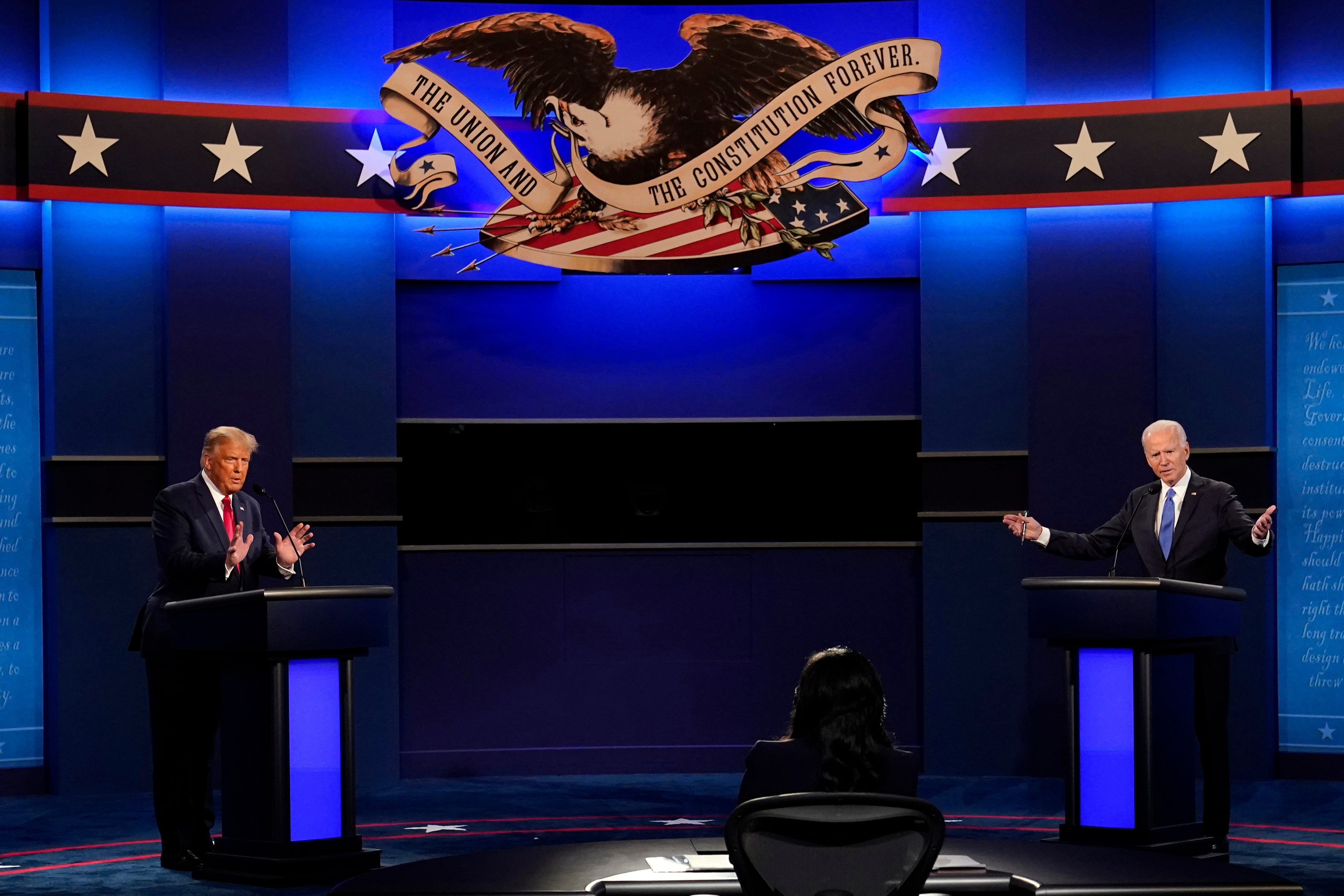
Trump Derangement Syndrome
If you have expressed discontent with the former president, you might be susceptible to getting diagnosed with Trump Derangement Syndrome (TDS). Trump has used the term — er, disease — to describe those who have openly and repeatedly, if not obsessively, disagreed with him and/or his policies.
Used in a sentence: “Crazy Liz Cheney, who may be responsible for destroying the evidence from the J6 Unselect Committee, making all cases, past and present, highly questionable, AT BEST, is suffering from a massive case of TRUMP DERANGEMENT SYNDROME.”
Very stable genius
Trump called himself a “very stable genius” in a Twitter tirade in January 2018 seemingly in an attempt to defend his cognitive ability amid the release of Michael Wolff’s book Fire and Fury, which discussed his mental health.
Wolff wrote, “It used to be inside of 30 minutes he’d repeat, word-for-word and expression-for-expression, the same three stories – now it was within 10 minutes.” The White House called the book’s claims “complete fantasy.”
Used in a sentence: “I went from VERY successful businessman, to top T.V. Star……to President of the United States (on my first try). I think that would qualify as not smart, but genius….and a very stable genius at that!”
Witch hunt/Hoax
Trump uses the phrases a “witch hunt” and/or a “hoax” to describe lawsuits against and inquiries into him. He has labeled the Mueller investigation, the FBI raid of Mar-a-Lago, numerous legal battles and both impeachments with the moniker.
Used in a sentence: “On the impeachment, it’s really a continuation of the greatest witch hunt in the history of politics.”

